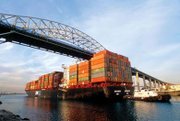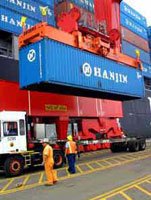Ports to Keep Gates Open Longer to Ease Congestion
In one month, the ports of Los Angeles and Long Beach, Calif., will open their gates on an extended basis so truckers can pick up or deliver cargo containers at night and on Saturdays.
The new program, called PierPass Inc., has taken almost one year to develop and has had its launch postponed four times.
Now that the program is finally scheduled to begin on July 23, the import community is wondering whether these extended hours will really solve the ports’ congestion problem or just add one more expense to importing goods from overseas.
Currently, port gates at the 12 terminals are open Mondays through Fridays, from 8 a.m. to 5 p.m. But long delays in picking up cargo, increased air pollution and congested freeways have prompted terminal operators at both ports to extend their pickup times.
Under the PierPass program, the ports’ off-peak hours will be from 6 p.m. to 3 a.m. on Mondays through Thursdays and from 8 a.m. to 5 p.m. on Saturdays.
Those who stand to benefit the most are big-box stores and operations whose warehouses are open long hours or round-the-clock.
Those who will be penalized are mid-size importers who operate during regular daytime hours. With the PierPass program, importers or exporters will have to pay $40 per 20-foot container and $80 per 40-foot container to pick up cargo during the day. Intermodal cargo shipments transported by trains on the Alameda Corridor pay no daytime fees. The fees will fund the $160 million it will cost the 12 terminals at both ports to stay open longer.
Many apparel companies will have no choice but to add the extra cargo cost to their bottom lines unless they want to pay employees overtime to have dock doors open late at night.
“The fact that they are having the ports open at night is good to keep the flow moving, but to put a levy on picking up during the day is absurd,” said Ron Perilman, president and chief executive of City Girl Inc., a $35 million apparel company in Los Angeles that imports about 95 percent of its clothing lines from overseas. “The problem with picking up at night is you have to be open at night to receive the containers. I would probably only do it on a per-situation basis.”
Will it work?
The first few days of the PierPass program are expected to be a bit chaotic as truckers, freight forwarders, customs brokers and importers adjust to the new system.
Particularly crucial is that all importers be registered with the PierPass program to pick up containers. To do that, shippers must supply a credit card number or agree to some form of electronic payment to pay their daytime pickup fees. All this can be done online at www.pierpass.org.
Shippers who have not registered with PierPass will not be able to deliver or pick up their containers at the ports. The result could be stacks of containers stuck on the docks.
“Getting people convinced this is going to happen has been the biggest hurdle, communicating to the importers and exporters that the program is taking place,” said Bruce Wargo, PierPass’ president. Wargo has been making the rounds, speaking at luncheons and other events to inform trucking companies, freight forwarders, customs brokers and importers about the new program.
“Our first-year goal is to have 20 to 25 percent of the cargo at the ports picked up during the off-peak hours,” Wargo said.
So far, about 1,035 companies have registered online, he said. “Typically your big-box operators are applying, like Target, Kohl’s, JCPenney, Home Depot and Lowe’s,” he explained.
Others registering are freight forwarders, customs brokers, trucking companies and anyone whose name will be on the bill of lading.
Bottled up
The PierPass program was developed after a wave of imports hit the two ports last summer. The crunch of cargo meant that goods were taking up to one week to be unloaded from ships. The delay put a crimp in many apparel manufacturers’ schedules and led to scores of canceled orders with retailers.
At one point in August, there were 90 ships either docked or waiting for a berth. The coast off Long Beach started to look like a watery parking lot for ships.
Last year’s cargo backup was caused by a shortage of longshore workers, truck drivers, trains and railroad personnel to handle cargo containers as well as by increased shipments from overseas factories where labor is cheap.
Last year, the Port of Long Beach saw its cargo container volume jump by 24 percent; the port handled 5.8 million 20-foot containers in 2004. During the first five months of this year, container traffic was up 28.7 percent.
Traffic at the Port of Los Angeles has increased at a slower rate. In 2004, the port handled 7.3 million 20-foot containers, a 2 percent increase over the previous year.
Truckers are taxed
Keeping the ports open longer hours will solve part of the congestion problem. But a lot of the program’s success depends on the 11,000 independent truckers who pick up 99 percent of the ports’ cargo. Many truckers are balking at working in the middle of the night if their pay does not increase.
“The owner/operators of these trucks have been hit hard with fuel costs and other operating costs,” said Patty Senecal, vice president of sales and marketing at Transport Express Inc., a trucking company that employs scores of independent truckers who pick up containers at the ports. “Rates haven’t kept pace with costs. And then there are the quality-of-life issues. Now you are asking people to work nights from Monday through Thursday and work Saturdays. There should be better compensation to work these hours and give up family time.”
Some companies that employ independent truckers are asking clients to pay an additional $50 to $80 to pick up a load at night, with part of that fee being passed on to drivers. But that pretty much cancels out the cost benefit of loading a container at night.
PierPass organizers maintain that drivers, who are paid per load, will be able to pick up more containers during a shift because there will be less congestion at the ports. Load payments range from $45 to $65 for an empty container and from $80 to $200 for a loaded container.
PierPass officials recently organized a Saturday seminar for truckers to inform them about the new program. About 200 truckers showed up.
“It was kind of a mixed response, which I would expect,” Wargo said of the seminar. “But the bottom line is we are a port facility. We are going to have to work day and night in the future. And the future is right around the corner.”























